An insider look at the Chinese Communist Party; a handbook of music's role in religion around the world; a comprehensive collection of the finest scholarly research on quantum logic. These are just some of the prolific topics addressed in books by Columbian College faculty this year. Whether you’re in the mood for a debate on the pros and cons of free market forces on people’s lives or you’re searching for a deeper understanding of the basic tenets of Islamic beliefs, you’ll discover thought-provoking and timely titles in this scholarly library. The following is a sampling of recent books.
The Dictator's Dilemma: The Chinese Communist Party's Strategy for Survival
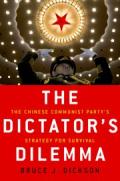 Political observers predicted the fall of the Chinese Communist Party (CCP) following the Tiananmen Square crackdown in 1989. When the party weathered the storm, pundits again forecast its demise after the serial collapse of communist regimes behind the Iron Curtain. Neither prediction proved true. China continued to experience economic growth and relative political stability since 1989. In The Dictator's Dilemma, Bruce J. Dickson, professor of political science and international affairs, examines why the CCP enjoys high popular support and how its policies have changed with the times. Dispelling notions of the party's impending implosion, he contends that, while it may generate resentment and protest, the CCP is not cut off from the people it governs and tolerates a growing and diverse civil society.
Political observers predicted the fall of the Chinese Communist Party (CCP) following the Tiananmen Square crackdown in 1989. When the party weathered the storm, pundits again forecast its demise after the serial collapse of communist regimes behind the Iron Curtain. Neither prediction proved true. China continued to experience economic growth and relative political stability since 1989. In The Dictator's Dilemma, Bruce J. Dickson, professor of political science and international affairs, examines why the CCP enjoys high popular support and how its policies have changed with the times. Dispelling notions of the party's impending implosion, he contends that, while it may generate resentment and protest, the CCP is not cut off from the people it governs and tolerates a growing and diverse civil society.
The Oxford Handbook of Music and World Christianities
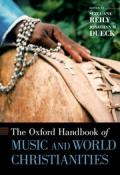 Assistant Professor of Writing Jonathan Dueck collected and co-edited this volume of essays from leading scholars in the fast-emerging field of ethnomusicology. The Oxford Handbook of Music and World Christianities investigates music's role in everyday practice and social history across the diversity of Christian religions and practices around the globe. It explores Christian communities in the Americas, Europe, Africa, Asia and Australia as sites that have created an array of musical traditions. The Handbook focuses on five themes: music and missions; music and religious utopias; music and conflict; music and transnational flows; and music and everyday life. Taken together, each element paints a broad picture of Christianity and its relationship to music as a channel for encompassing and negotiating deeply rooted moral and cultural values.
Assistant Professor of Writing Jonathan Dueck collected and co-edited this volume of essays from leading scholars in the fast-emerging field of ethnomusicology. The Oxford Handbook of Music and World Christianities investigates music's role in everyday practice and social history across the diversity of Christian religions and practices around the globe. It explores Christian communities in the Americas, Europe, Africa, Asia and Australia as sites that have created an array of musical traditions. The Handbook focuses on five themes: music and missions; music and religious utopias; music and conflict; music and transnational flows; and music and everyday life. Taken together, each element paints a broad picture of Christianity and its relationship to music as a channel for encompassing and negotiating deeply rooted moral and cultural values.
Writing Neoliberal Values: Rhetorical Connectivities and Globalized Capitalism
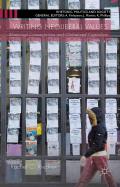 In Writing Neoliberal Values, Rachel Riedner, associate professor of women's studies, challenges stories that promote narratives about free markets bringing freedom and economic stability to marginalized people. By focusing on individual cases, these stories create portraits of worthy, valued people—often women—who are brought into the technologies of modernity, allowing them to participate in and contribute to markets. The narratives are designed to demonstrate that poverty and violence can be overcome, and that prosperity is in reach to anyone who embraces modern life—despite their circumstances. But Riedner argues that they are built on false pretenses. She highlights the dangers of tying neoliberal ideals of self-responsibility, inclusion and freedom to economic values of privatization, free markets and free trade. These human-interest stories, she maintains, celebrate individual ability and success but ignore the complex reasons for poverty and exclusion.
In Writing Neoliberal Values, Rachel Riedner, associate professor of women's studies, challenges stories that promote narratives about free markets bringing freedom and economic stability to marginalized people. By focusing on individual cases, these stories create portraits of worthy, valued people—often women—who are brought into the technologies of modernity, allowing them to participate in and contribute to markets. The narratives are designed to demonstrate that poverty and violence can be overcome, and that prosperity is in reach to anyone who embraces modern life—despite their circumstances. But Riedner argues that they are built on false pretenses. She highlights the dangers of tying neoliberal ideals of self-responsibility, inclusion and freedom to economic values of privatization, free markets and free trade. These human-interest stories, she maintains, celebrate individual ability and success but ignore the complex reasons for poverty and exclusion.
Logic and Algebraic Structures in Quantum Computing
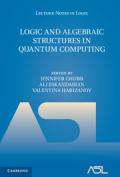 Professor of Physics Ali Eskandarian and Professor of Mathematics Valentina Harizanov compiled this collection of international cross-disciplinary research on physics and quantum logic. With contributions from leading experts exploring connections across their respective fields—from logicians and mathematicians to computer scientists and physicists—the book serves as an anthology of modern insight into the fundamental questions surrounding the nature and behavior of matter and energy. It explores themes ranging from philosophical examination of the foundations of physics and quantum logic to exploitations of the methods and structures of operator theory, category theory and knot theory.
Professor of Physics Ali Eskandarian and Professor of Mathematics Valentina Harizanov compiled this collection of international cross-disciplinary research on physics and quantum logic. With contributions from leading experts exploring connections across their respective fields—from logicians and mathematicians to computer scientists and physicists—the book serves as an anthology of modern insight into the fundamental questions surrounding the nature and behavior of matter and energy. It explores themes ranging from philosophical examination of the foundations of physics and quantum logic to exploitations of the methods and structures of operator theory, category theory and knot theory.
Life After Death: Resurrection, Judgment, and the Final Destiny of the Soul
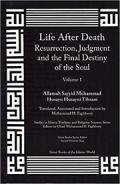 With religious turmoil and tension dominating the global headlines, many people around the world hold confused or incorrect views about Islamic teachings and tradition. In Life After Death: Resurrection, Judgment, and the Final Destiny of the Soul, Professor of Religion Mohammad Faghfoory translates, annotates and introduces scholarly theses that explore the concept of death in Islam, and the way the Islamic idea of an afterlife can inspire adherents toward a morally upstanding existence. Belief in life after death is the first among the five fundamental pillars of Islamic tradition; without it, the religion teaches, the other pillars become meaningless. Faghfoory shows how Muslims regard this essential tenet of their faith as a concept that gives meaning to life and illuminates the purpose of the creation of man.
With religious turmoil and tension dominating the global headlines, many people around the world hold confused or incorrect views about Islamic teachings and tradition. In Life After Death: Resurrection, Judgment, and the Final Destiny of the Soul, Professor of Religion Mohammad Faghfoory translates, annotates and introduces scholarly theses that explore the concept of death in Islam, and the way the Islamic idea of an afterlife can inspire adherents toward a morally upstanding existence. Belief in life after death is the first among the five fundamental pillars of Islamic tradition; without it, the religion teaches, the other pillars become meaningless. Faghfoory shows how Muslims regard this essential tenet of their faith as a concept that gives meaning to life and illuminates the purpose of the creation of man.
For a complete list of new books by Columbian College faculty, visit https://magazine.columbian.gwu.edu/selected-new-books-columbian-college-faculty-0.


